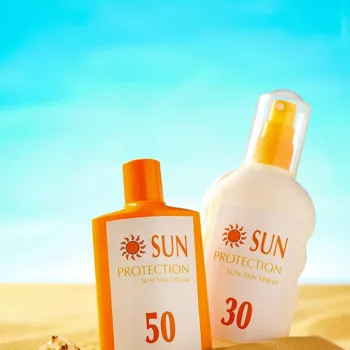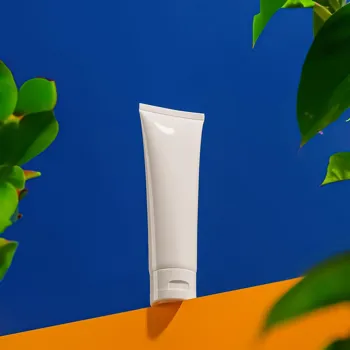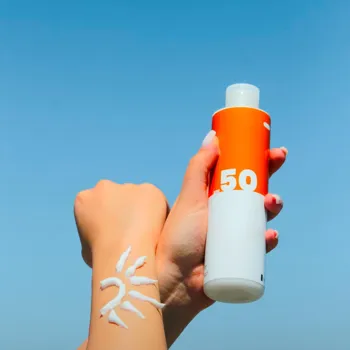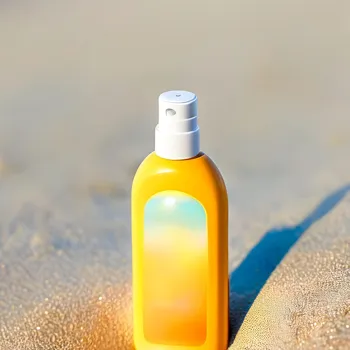Discover the secrets to selecting the perfect sunscreen for your skin type. Read on to decode SPF, skin types, and more!
With the summer heat beating down on us, sunscreen isn't just a beach essential anymore;
it's an everyday necessity. From battling the harsh Delhi sun to navigating the humid Chennai weather, protecting your skin from harmful UV rays is crucial.

But walking down the sunscreen aisle can be overwhelming, isn't it? So many options, so many confusing terms! This guide is here to help you navigate the world of sunscreens and find the perfect one for your unique skin. Because let's face it, what works for your friend might not work for you.
Understanding the Basics: SPF, Broad Spectrum, and UV Rays
Before diving into skin types, let's quickly brush up on the sunscreen basics. SPF, or Sun Protection Factor, measures how well a sunscreen protects you from UVB rays, which are responsible for sunburn.
The higher the SPF, the more protection you get. Broad spectrum means the sunscreen protects you from both UVA and UVB rays. UVA rays contribute to skin aging, while UVB rays cause sunburn. Both can increase your risk of skin cancer, so broad spectrum protection is vital.
Always remember, even on cloudy days, UV rays can penetrate through! Don't skip the sunscreen just because you don't see the sun. Make it an important part of your daily routine.
Identifying Your Skin Type: The Key to Sunscreen Success
Choosing the right sunscreen starts with knowing your skin type. Is your skin oily, dry, sensitive, or a combination? Each skin type has different needs and reacts differently to sunscreen ingredients.
A sunscreen that feels light and comfortable on dry skin might feel greasy on oily skin, and vice versa. Knowing your skin type is half the battle won when it comes to finding the perfect match.
Consider visiting a dermatologist for a professional skin analysis if you're unsure about your skin type. They can provide personalized recommendations and help you choose products that are best suited for your skin. Remember, taking care of your skin is an investment in your future!
Sunscreen Recommendations for Different Skin Types
Now, let's move on to specific sunscreen recommendations based on skin type.
Oily Skin
Look for oil-free or gel-based sunscreens. These formulas are lightweight and won't clog your pores, helping to prevent breakouts. Key ingredients to look for include silica or zinc oxide, which can help absorb excess oil.

Dry Skin
Opt for creamy or moisturizing sunscreens. These formulas contain hydrating ingredients like hyaluronic acid or ceramides that can help keep your skin hydrated throughout the day. Avoid sunscreens with alcohol, as they can further dry out your skin.

Sensitive Skin
Choose mineral sunscreens with zinc oxide or titanium dioxide. These ingredients are less likely to cause irritation compared to chemical filters. Look for fragrance-free and hypoallergenic formulas.

Combination Skin
Finding the right balance is key. Look for lightweight, broad-spectrum sunscreens that are neither too oily nor too drying. Experiment with different formulas to see what works best for your skin.

Acne Prone Skin
Seek out "non-comedogenic" sunscreens. These are specifically formulated not to clog pores. Salicylic acid is also helpful for preventing breakouts.
Application Tips and Tricks
Applying sunscreen correctly is just as important as choosing the right one. Use about a teaspoon of sunscreen for your face and neck. Apply sunscreen at least 15-20 minutes before sun exposure to allow it to absorb properly.

Don't forget often-missed areas like your ears, the back of your neck, and your hairline. Reapply every two hours, or more often if you’re sweating or swimming. Even "water-resistant" sunscreens need to be reapplied!
Debunking Common Sunscreen Myths
There are many misconceptions about sunscreen, let's clear a few of them up. Myth: "I don't need sunscreen on cloudy days". Truth: UV rays can penetrate clouds, so you should still wear sunscreen even when it's overcast.
Myth: "Darker skin tones don't need sunscreen.” Truth: Everyone, regardless of skin tone, can be affected by sun damage. Myth: "Once I apply sunscreen in the morning, I’m protected all day.” Truth: Sunscreen needs to be reapplied every two hours for optimal protection. Myth: "Sunscreen expires".
Truth: Sunscreens do expire, and using an expired sunscreen won't provide adequate protection. Always check the expiration date before using.
Choosing the right sunscreen involves understanding sunscreen lingo, recognizing your individual skin properties, and doing some experimentation.
Sunscreen should be part of daily routine for a life time to help protect yourself from long term effects. Remember to consult with your doctor, if unsure. He can help you better understand your skin conditions like acne, oily skin and other skin related problems.













